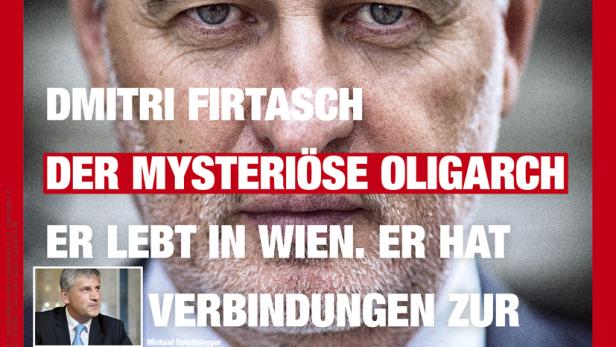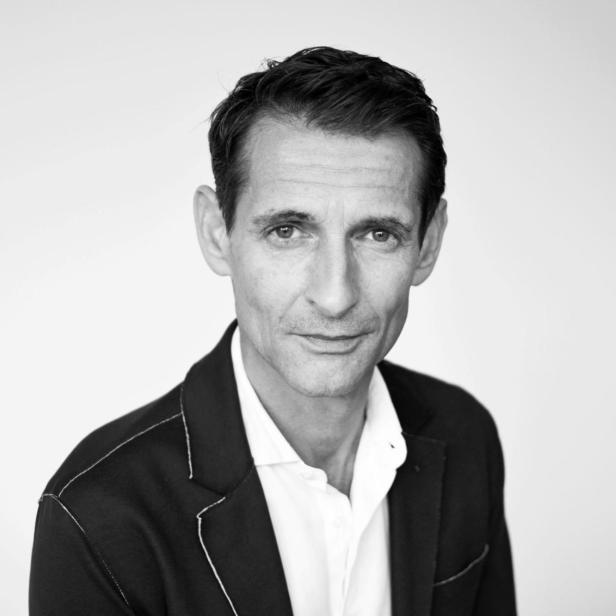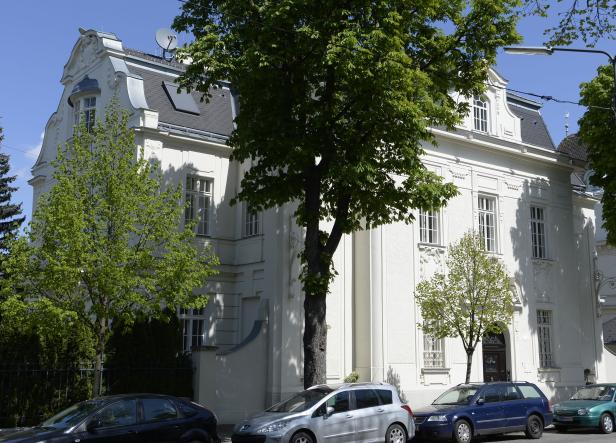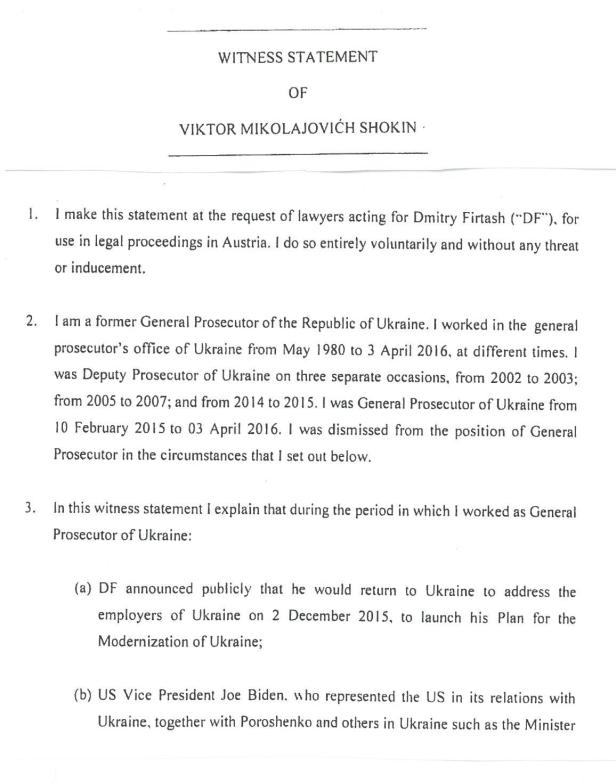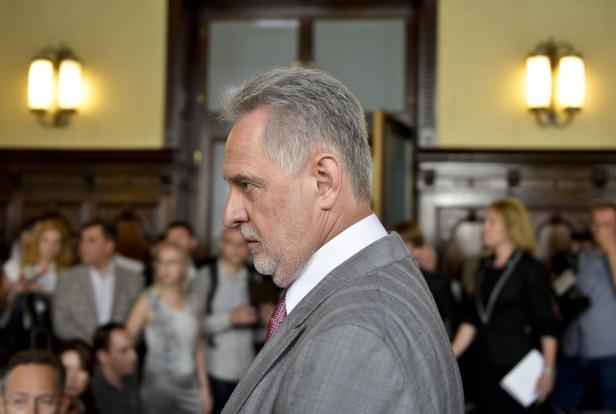English edition: All the President's Men
This article was published in the profil print edition, issued October, 20th 2019. With respect to the international dimension of the events surrounding the Ukrainian oligarch Dmitri Firtash, we make the text available in English. A big thank you to Tessa Szyszkowitz and Sebastian Hofer for their precious expertise.
The mansion in Vienna-Hietzing is one of the city's most expensive habitats. Built in 1908, renovated in 2010 and refined into a piece of hedonism: 1300 square metres of living space on three floors, 15 rooms, seven bathrooms, four terraces, elevator, home cinema, wine cellar, spa, English lawn, old trees and an infinity pool with pool house. In the spring of 2013 the owner Alexander Schütz, founder of the Viennese fund company C-Quadrat, wanted to sell the property. The real estate agents Knight Frank (London) and Otto ( Vienna) had asked 25 million euros for the "magnificent Art Nouveau villa of absolute superlatives". And even though there had been a nice story about the property in the "Wall Street Journal", Schütz couldn’t find a buyer. At least he found a tenant from abroad who needed a place to stay in Vienna after external circumstances had stranded him here.
Six years later, this tenant, a Ukrainian businessman, is still there - and suddenly this Viennese villa with its oak parquet floors and the open fireplace in the kitchen is one of numerous settings of an affair that could cost the 45th President of the United States of America his job.
1 – The Man in the Shadow
This is a complex story unfolding on both sides of the Atlantic. It spans more than a decade and involves the White House, the Kremlin, the Ukrainian elite, Austrian domestic politics, diplomats, lobbyists, lawyers, courts, the Russian Gazprom group and Raiffeisen Bank.
The story is about profits from the trade in Turkmen and Russian natural gas, geostrategic interests, political intrigues, power, abuse of power, offshore companies, corruption and money laundering. In the center of this story is the inhabitant of the Villa in Hietzing: Dmitri (or Dmytro) Wassylowytsch Firtash. Ukrainian, oligarch, entrepreneur, investor, president of the Federation of Employers of Ukraine, publicity-shy. Founder of the widely ramified "Group DF" with addresses around the globe, many of them in tax havens. Chemical products, natural gas, titanium mining, media, real estate, banking (for the sake of completeness, it should be mentioned that his German Wikipedia entry also lists him as a "philanthropist").
Dmitri Firtash, however, could also cause quite an embarrassment to none other than Donald Trump.
2 – Under pressure
The Ukraine affair is increasingly becoming a problem for Donald Trump. The US president is suspected of abusing his powers: with the help of his lawyer Rudy Giuliani, once mayor of New York (1994 to 2001), he is said to have tried to put Ukraine under pressure at various levels – in order to obtain material that would disavow his rivals from the democratic party. First and foremost Joe Biden, a possible challenger in the presidential elections on November 3, 2020. Biden's son Hunter has been pursuing business interests in Ukraine for some time, including being a member of the supervisory board of the Ukrainian gas company Burisma. At the end of last week, Trump's provisional Chief of Staff, Mick Mulvaney, caused a scandal in Washington. In front of running television cameras, he freely admitted that Trump had withheld $391 million in military aid for Ukraine granted by Congress for months in order to persuade the government in Kiev to conduct politically motivated investigations. Mulvaney referred to the wild rumour that Ukrainian (not Russian) hackers might have gained access to e-mails from the then presidential candidate Hillary Clinton in 2016. Although Mulvaney tried to put his own statements into perspective shortly afterwards, the damage had already been done.
At the same time the US ambassador to the European Union, Gordon Sondland, testified under oath in a hearing that Trump had instructed US diplomats concerned with Ukraine to cooperate with his lawyer Rudy Giuliani. Giuliani, on the other hand, had also advocated that Ukraine should initiate corruption investigations against the Burisma gas company (the company for which Joe Biden's son worked).
There is also evidence of a telephone conversation between Trump and Ukrainian President Volodomir Selenski, in which the president of the United States motivated his Ukrainian counterpart to investigate Joe Biden and his son.
For Donald Trump, things are slowly getting tight. The impeachment procedure currently being prepared by the Democrats could start before the end of the year. It would be the third in the history of the USA (after 1868 against Andrew Johnson and 1998 against Bill Clinton, which failed. Richard Nixon had prevented an impeachment in 1974 by resigning).
3 – An Art Nouveau prison
One strand of this affair leads to the magnificent villa in Vienna-Hietzing. Dmitri Firtash has been living here since 2013/2014. The 54-year-old billionaire had been a power factor in Ukraine for many years, both economically and politically. At times he was the largest gas trader in the country, was considered an intimate enemy of the former Prime Minister Yulia Timoshenko and a friend and patron of the former Prime Minister and State President Viktor Yanukovych (who had to resign after the Maidan protests in 2014).
Firtash continues to be a wealthy and influential man who also cultivates contacts with highest circles in Austria. But his influence has been spatially limited for years. He has been stuck in Vienna since 2014. A public prosecutor in Chicago accuses him of corruption in connection with a business deal in India, which also involved Boeing (against which, however, no accusation has yet been made). Firtash fights it with the help of a cohort of lawyers, PR consultants and lobbyists on both sides of the Atlantic. Central argument of the defense: The deeds blamed on Firtash in India never happened, the US trial is purely politically motivated.
Austria's judiciary conducted a protracted extradition procedure, which ended with a decision by the Supreme Court earlier this year: Firtash may be extradited.
Nevertheless Firtash has not been extradited to the US yet – a circumstance he owes to his Austrian lawyers: Dieter Böhmdorfer, Otto Dietrich and Christian Hausmaninger. They try to have the proceedings renewed on the basis of new evidence and have obtained a postponement of the extradition. How come that an Ukrainian stuck in Vienna, whom the US Department of Justice wants to see behind bars, causes such embarrassment to the current US President?
4 – An incriminating statement
Entry Rudy Giuliani. On October 6, Trump’s personal lawyer gave „Fox News“ an interview in which he made accusations against Biden's son Hunter, but also against special investigator Robert Mueller. Giuliani referred to documents available to him, without, of course, mentioning where they came from. Research by "Time Magazine" finally led to Vienna. To Firtash. "How a Ukrainian Oligarch Wanted by U.S. Authorities Helped Guiliani Attack Biden", "Time" titled an article that went online on October 15.
profil was able to verify this in the meantime. In fact, at least one of the documents cited by Giuliani is part of the Austrian Firtash extradition file. It is an affidavit of the former Attorney General of Ukraine, Viktor Shokin, in which he accuses Joe Biden of having obstructed investigations against his son in Ukraine (at the same time Shokin paints Firtash as a victim of US-American interests. He thus supports the defense’s argument that the US trial is politically motivated).
Shokin made his statement to a notary in Kiev in September of this year. He began by stating that he had agreed to do so at the request of Firtash's lawyers. The document then went into the court files in a German translation - it is solely relevant for the extradition proceedings here. And yet this Austrian evidence was used by Donald Trump's personal lawyer Rudy Giuliani (in English translation) in the USA to put Biden under political pressure. How did Giuliani obtain the sworn statement of the Ukrainian Shokin? And what led Shokin to not testify for Firtash until 2019, i.e. five years after the extradition proceedings had come to an end?
In the course of this investigation it was not possible to talk to Dmitri Firtash personally. Via his Viennese PR consultant Daniel Kapp, a man with good contacts in the Austrian People’s Party (ÖVP), profil sent a series of questions last week, most of which remained unanswered.
In his statement to profil, however, Firtash emphasizes that he never met Rudy Giuliani and never had „any plans to do so“.
The matter is mysterious. But this adjective has accompanied Firtash for some time.
5 – In the beginning there were tomatoes
Dmitri Firtash was not born in an Art Nouveau palace. Quite the contrary. He was born on May 2, 1965 in Western Ukraine, Soviet Union. His father was a teacher, his mother worked in a sugar factory. They were poor and earned an extra income by growing tomatoes, as Firtash later said in an interview. At the age of 19, he joined the army for two years, after which he is said to have worked as a fireman.
In those days Donald Trump had already built his Trump Tower in New York and had styled himself as womanizing socialite. But it took Firtash only a little more than a decade to maneuver himself into a position that is hardly inferior in wealth and influence to Trump’s. This was made possible by the collapse of the Soviet Union: venturers and dubious businessmen took over the factories of the former world power.
Firtash became very rich. How this happened remains controversial: He himself claims to have set up a canned food business in Central Asia with his wife. He regularly exchanged his goods for gas, so he established valuable contacts over the years. Shortly after the turn of the millennium, his name appeared in a Hungarian company trading gas from Turkmenistan via Russia to the Ukraine.
It is a remarkable ascent: Firtash had transformed from a canned goods trader into a middleman in the Central European gas business – one of the continent's most important geostrategic fields. According to research by the „Kyiv Post“ he had worked as a driver in Ukraine in the mid-1990s. How did he manage his transformation to one oft he richest men in the former Soviet Empire?
He himself says he worked hard. But his opponents spread another theory: That Firtash was a straw man of the Ukrainian criminal Semyon Mogiljewitsch, who is considered as a boss of the Russian mafia by US authorities. The godfather, so the theory goes, introduced him to Moscow circles – Firtash has repeatedly denied this. There is no evidence of a connection between the two Ukrainians, even if they keep overlapping: Firtash once took over shares in a Cypriot shell corporation from Mogilevich's wife; he worked with people who had connections to Mogilevich. In a conversation with the Ukrainian US ambassador, Firtash is said to have confessed that he had to get Mogilevich's permission to do business in Turkmenistan. Firtash later said that he had been misunderstood.
6 –Tegethoffstraße 1, Vienna
July 2004: While Donald Trump was doing the first season of his reality TV show „The Apprentice“ and Firtash had earned millions through gas trading, three trustees of Raiffeisen Investment AG founded a company in Tegethoffstrasse 1 in Vienna's 1st district: Centragas Holding AG.
It was a memorable development, which from now on would inseparably connect the Firtash case with Austria. The company, unknown at the time, owned half of the Swiss company that would soon handle the entire gas trading business in Ukraine. The man who wanted to keep his name secret for the time being and for whom the Raiffeisen bankers worked as trustees: Dmitri Firtash.
Reuters news agency years later explained his business model: The Russian state-owned company Gazprom sold gas at ridiculously low prices to Firtash. He resold it at normal prices. He kept the difference - in order to finance politics in Moscow's interests (Firtash denied this, as did the Kremlin). Every Ukrainian politician has to spend a lot of his or her time on managing the relationship with Russia. It is extremely difficult for outsiders to keep track of all the different accusations and interests.
Raiffeisen bankers claimed to have put Firtash under intense scrutiny for alleged contacts with Russian mafia before agreeing to act as a trustee for him. "The third question was, did the client have any links to known criminals in the past? In the course of answering that question, some issues came up“, Raiffeisen representative Wolfgang Putschek, who was responsible for the deal, told the „Financial Times“ in 2006: "But they were explained. That is, they were cleared off."
7 – A revolution and a former chancellor
In the years after 2005 Firtash earned a lot of money with gas. But not only with gas. He was also involved in Ukrainian politics, supported pro-Russian parties, bought TV stations, factories, invested in titanium – the latter would bring him into legal trouble years later. He sponsored British elite universities. He bought an old subway building in Knightsbridge adjacent to his London mansion in order to extend his property. Met all kinds of businessmen: Among them was a US-American consultant who had come to the country to advise the pro-Russian President Viktor Yanukovych. In 2008, Firtash was planning a hotel project in New York with the said American, but the plan never was implemented. The American’s name: Paul Manafort. Eight years later, he would briefly lead Donald Trump's election campaign. At the moment, he is in a US prison for tax evasion and fraud. The political advisor and lobbyist is a central piece of the puzzle. Another piece bears the name Alfred Gusenbauer, former Federal Chancellor and party chairman of the Austrian social democratic party SPÖ. Gusenbauer was part of a team of consultants mandated by Manafort ("Hapsburg Group"), that toured the world in 2012/2013 to cultivate the image of Yanukovych's Ukraine. According to US special investigator Robert Mueller, Gusenbauer and his partners, former Italian Prime Minister Romano Prodi and Poland’s former president Alexander Kwaśniewski received almost two million US dollars for their Ukrainian lobbying acitivities.
8 – 2014, year of change
In February 2014, the so-called Maidan uprising reached its peak. Yanukovych, who was loyal to Moscow, fled in a helicopter across the border to Russia. Among other things, Firtash had financed the election campaign of the pro-Russian president, in which Manafort had also taken part. Shortly after Yanukovych's departure, Russian soldiers marched into the Crimea.
A man like Firtash – with his network, his money, his power and his knowledge – was believed to play an important role in those days. „He is a kingmaker, one who can and does influence election results“, asserted his lawyer Dieter Böhmdorfer, a former minister of justice from the Austrian Freedom Party (FPÖ), years later in a Viennese courtroom where the Ukrainian fought for his freedom.
In 2014, the multi-billionaire had been arrested in Vienna. He was released shortly afterwards on a record bail. Since then, the Ukrainian has not set foot in his home country. How powerful he still is can be seen in the behaviour of his opponents: Four years ago, when rumours began to spread that Firtash would soon be making his way to the Ukraine by plane, the Ukrainian authorities had the airspace closed to private jets on short notice.
9 – The struggle for extradition
When Firtash was arrested on March 12, 2014 in Vienna, this may have come as a surprise for him. In fact, there was a month-long run-up. In June 2013, Firtash and five other persons had already been indicted in a court in Chicago. In the indictment the group is accused of bribing public officials regarding a project in India. Firtash has always denied all allegations.
The charges were sealed for months in Chicago. At the end of October 2013, the US judiciary applied for Firtash's arrest and extradition for the first time, as Firtash has a company headquarter in Vienna. Shortly before Austria could execute the arrest warrant, however, the Americans withdrew unexpectedly. Firtash remained undisturbed. Later, the Ukrainian's lawyers claimed in court that this was one evidence that the US extradition request was politically motivated. Their line of argument: When the Ukrainian government sent signals that were acceptable to the USA, the Americans for strategic reasons refrained from arresting Firtash, who was considered an influential advisor to Yanukovych. But, when the political situation in Ukraine changed a few months later, they decided to take Firtash, who is said to be close to Russia, out of the political game.
As far as connections to Moscow are concerned, Firtash indeed has quite something to show. Even now his connections to the Kremlin remain excellent. The bail of 125 million euros, on which the oligarch was released after his arrest in Vienna, came from Russia via Belgium to Austria. The billionaire Vasily Anisimov, president of the Russian Judo Association, paid for it. Judo is known to be the favourite sport of Russia's President Putin. Coincidentally, Anisimov's oligarch friend Arkady Rotenberg was, in his youth, a Judo partner of Mr. Putin. But traces can also be found to people well connected with another Russian oligarch: during his involuntary stay in Vienna, Firtash began to use a house in Vienna’s City Center that – via intermediate companies – belongs to former Magna boss Siegfried Wolf. Wolf is a top manager in the business empire of the Russian oligarch Oleg Deripaska. Wolf did not only take care of Firtash. He also invited Deripaska's father-in-law and his wife to stay. She is the daughter of former Russian President Boris Yeltsin.
The extradition agreement between Austria and the United States contains a clause according to which extradition may not take place if there are political reasons for the application. In fact, in April 2015, the Vienna Regional Court rejected Firtash’s extradition to the USA for this reason. In February 2017, however, a higher court ruled against Firtash. At the end of June 2019, the Austrian Supreme Court (OGH) confirmed that extradition was justifiable. Subsequently, Minister of Justice Clemens Jabloner, who has the final say in extradition proceedings, gave his consent.
Based on alleged new evidence Firtash’s team of lawyers quickly filed an application with the Regional Court following the Supreme Court’s decision to start the case all over again. This can only happen if the evidence submitted could change the original assessment. It may be assumed that Firtash's advisors began collecting such evidence some time ago in order to have something up their sleeve just in case.
A ruling this year seems unlikely. Apart from that, if Firtash loses the case in the first instance, the way to the Higher Regional Court remains open to him. A central document in the application is the mentioned affidavit by the former Ukrainian Attorney General Viktor Shokin. And this paper could also play an important role in a possible impeachment trial against Trump.
10 – The Ukraine Society
The oligarch, however, wasn’t occupied with legal issues only. In Austria, he made the attempt to position himself as problem solver regarding the political situation in Ukraine. In 2015, Firtash launched an association named "Agency for Modernization of Ukraine" (AMU), which drew up a reform plan. The project was headed by Austria’s former foreign minister and vice chancellor Michael Spindelegger (ÖVP). Former German Finance Minister Peer Steinbrück (SPD) acted as an advisor.
Spindelegger still is on the board of the association, which is, however, no longer active. profil wanted to know how much money the AMU has received. This question remained unanswered with respect to „the interests of the donor". According to a written statement Ukrainian companies belonging to the Federation of Employers of Ukraine (FEU) had provided the financial means. Firtash personally played "no role", solely in his function as president of the FEU.
The high density of highly networked top personnel surrounding the oligarch is striking. When he landed his biggest coup in the gas business in 2004, he had Raiffeisen on his side. His lawyer, Dieter Böhmdorfer, is not only a former minister of justice. His law firm recently also represented the powerful general secretary of justice Christian Pilnacek. Böhmdorfer among other things helped the FPÖ to have the 2016 federal presidential election abolished. Daniel Kapp acts as Firtash's PR consultant. He was the spokesman of Josef Pröll, at that time vice chancellor for the Austrian People’s Party ÖVP.
Firtash's housing situation is also quite interesting: As already mentioned, the Hietzing Villa belongs - via an intermediate company - to a private foundation with ties to Alexander Schütz. The well-known investor and member of the supervisory board of Deutsche Bank not only donated a total of 85,000 Euros to the ÖVP; his wife also served as deputy chief of staff for ÖVP finance minister Hartwig Löger.
11 – Vienna, Andhra Pradesh, Chicago
As fiercely as Firtash fights his extradition - a victory in an Austria court would only be the second best solution. As long as the indictment is upheld in the US, he would remain massively restricted when travelling. Therefore it would be ideal for Firtash to settle the US case. If there were no more charges against him in the US, he would no longer have to deal with Austrian courts.
In the Chicago indictment, Firtash is accused of having authorized bribes of at least 18.5 million dollars for officials in India to obtain licenses for a mining project. One of the aims of the project was to supply so-called titanium sponge to the aircraft manufacturer Boeing. US authorities can legally prosecute corruption all over the world, if there is some sort of reference to the United States. In some cases it would be sufficient if money had been transferred via US banks.
Firtash denies all allegations. His lawyers have tried to fight the charges in court. In June 2019, however, a judge in Chicago rejected a motion to dismiss the case. This seems to limit Firtash's chances of achieving quick success on a legal level.
Could it be possible that other paths were taken? May Firtash have received signals that the proceedings would be discontinued if he supplied incriminating material against Trump's opponents? profil addressed this topic in a question to Firtash. The answer of his advisor Daniel Kapp: „Mr. Firtash unequivocally and categorically rejects this allegation as entirely false.“
How important Firtash really is shows another episode: After Robert Mueller was appointed to investigate if Russia had influenced the US presidential election in 2016, an investigator from Mueller's team approached Firtash's Chicago lawyer Dan Webb with a tempting offer. The public prosecutor offered Webb to drop the corruption charges against Firtash if he provided material about Trump's suspected connections to Russia. This is confirmed by persons closely familiar with the case.
This would mean that Mueller's team of investigators was confident that Dmitri Firtash would actually know something about Russia and the US president. The fact that the oligarch did not accept the Mueller deal was probably good for his reputation in the Trump camp.

